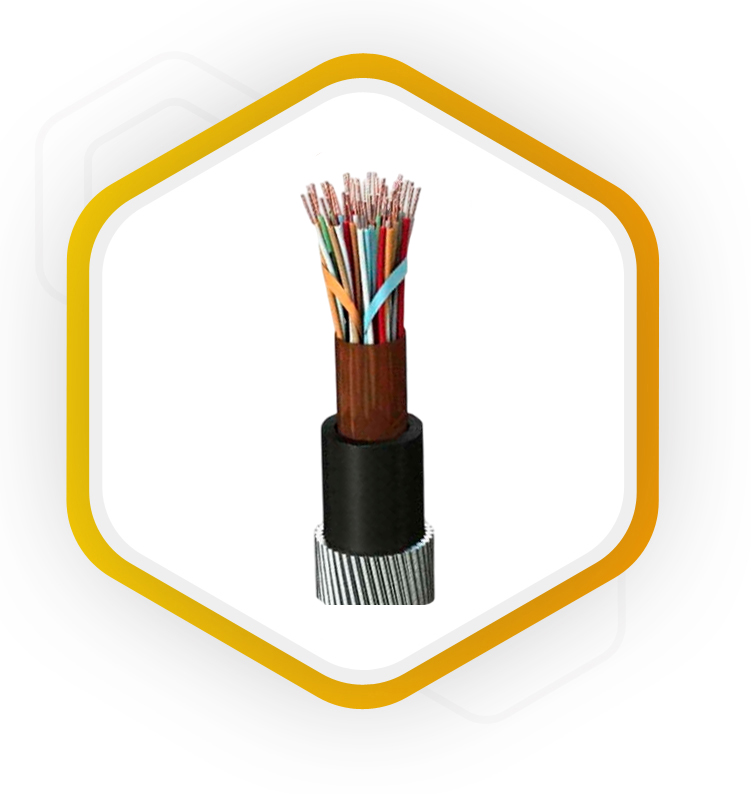Control Cables

We also Manufacture variety of cables like Fire Alarm Cables, Fire Survival Cables, Instrumentation Cables, Control Cables, Signal Cables, Screened Cables & Multicore Flexible Cables.
SRI PADMAVATHI CABLES, an ISO 9001: 2015 certified, MSME & GeM ( Govt. e-Market) registered company associated with manufacturing and marketing "SPCWIRREEz" Brand as per IS, BS & IEC Standards. Copper Conductor PVC/XLPE/PE Insulated Electrical Cables and wires. Voltage grade up to 1.1 KV.
Control cables are flexible cables used to transmit signals or power to control various equipment, such as machinery, automation systems, and vehicles. They are designed to handle low-voltage control circuits and can be used for instrumentation, power distribution, and signal transmission.
Key Features of Control Cables :
Control cables are essential for transmitting signals and electrical power in various industrial and commercial applications.
-
Multiple Conductors : Typically consist of multiple insulated copper or aluminum conductors for efficient signal transmission.
-
High Electrical Conductivity : Copper is commonly used due to its excellent conductivity and low resistance.
-
Shielding : Can be shielded with foil or braided screens to minimize electromagnetic interference (EMI) and radio frequency interference (RFI).
-
Insulation : PVC, XLPE, Teflon, or rubber insulation provides protection against moisture, chemicals, and extreme temperatures.
-
Weather & Chemical Resistance : Designed to withstand oil, water, UV radiation, and extreme temperatures for outdoor and industrial use.
-
Temperature Resistance : Can operate in extreme temperatures (-40°C to +90°C depending on material). Heat-resistant versions available for harsh conditions
-
Fire-Resistant and Low-Smoke Options : Available in fire-retardant, low-smoke, and halogen-free versions for safety in critical environments.
-
Voltage Rating : 1100V Suitable for low- to medium-voltage applications.
Types of Control Cables :
-
CY Control Cables - Shielded cables used for environments requiring interference protection.
-
SY Control Cables - Reinforced with steel wire braid for mechanical protection.
-
YY Control Cables - Flexible cables without shielding, used for general-purpose applications.
-
Instrumentation Cables - Used for signal and data transmission in industrial automation.
-
PVC, PUR, and LSZH (Low Smoke Zero Halogen) Variants - Based on application-specific needs, such as fire safety or chemical resistance.
Control Cables application industries :
Control cables are used in a wide range of industries where precise transmission of signals and power is needed for automation, communication, and control systems. Each industry has specific requirements for control cables, such as flexibility, durability, and resistance to environmental conditions.
Some major application industries include :
-
Aerospace & Defense - Control cables are crucial in aircraft engine systems, flight control, and communication. Used in military equipment and defense systems.
-
Energy & Power Plants - Applied in power generation, distribution, and transmission control systems. Used in nuclear, thermal, hydro, and renewable energy plants.
-
Oil & Gas Industry - Deployed in offshore drilling platforms and refineries. Used for monitoring and controlling hazardous environments.
-
Construction & Infrastructure - Essential in elevators, cranes, HVAC systems, and smart buildings. Used for security systems and automated gates.
-
Marine & Shipbuilding - Control systems for navigation, power distribution, and automation on ships. Used in offshore wind farms and subsea equipment.
-
Medical & Healthcare - Applied in diagnostic machines, hospital automation, and medical robotics. Used in patient monitoring and imaging equipment.
-
Telecommunications & Data Centers - Used for signal transmission in data networks and fiber optic systems. Ensures reliable connectivity in IT infrastructure.
-
Railway & Metro Systems - Deployed in signaling, braking, and automated control systems. Essential in high-speed rail and metro operations.
-
Industrial Automation & Manufacturing - Used in CNC machines, conveyors, and robotics. Provide reliable signal and power transmission in automated processes.
-
Automotive & Transportation - Used in vehicle control systems (braking, acceleration, transmission). Essential in railway signaling and metro automation.
